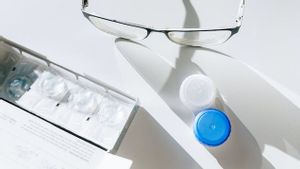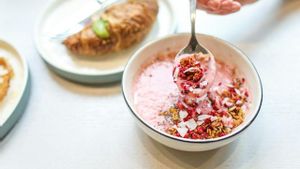JAKARTA - If you suffer from sinusitis or more often called sinus infection, you must understand very well the feeling of discomfort in the respiratory area. The American College of Allergy, Asthma, and Immunology noted that acute sine infections lasted between three and eight weeks.
Sinusitis is usually caused by infections that cause inflammation in your facial sine cavity, according to Yale Medicine. Symptoms include headaches, fever, runny nose, fatigue, mouth odor, cough, and nasal congestion.
Although there is no cure yet, there are some natural treatments for sinus infection that you can try. Such as nasal irrigation and drinking ginger tea to help relieve symptoms. In addition, you can also consult a doctor about adding supplements that support the immune system against sinusitis.
Telrell Smith, MD, the founding doctor at Spora Health, recommends an approach that prioritizes high nutritional foods to increase immunity. Also a series of vitamins that can be consumed to relieve sinusitis.
People with sinusitis are given vitamin D supplements or placebos to see if these vitamins can help their chronic infections. Those who take vitamin D supplements report much lower symptoms (sneezing, itching, nasal congestion, and runny nose) after three months, according to a study in June 2020 at Journal of Family Medicine and Primary Care.
"Vitamin D works as a hormone to support the immune system," said Dr. Smith as quoted by LIVESTRONG, Wednesday, February 28.
This helps fight infection and also the process of sinusitis inflammatory. Vitamin D is contained in a lot of food and milk, so I think consumption of foods with vitamin D is quite suitable for sinusitis.
Why is vitamin C important for sinusitis? The Centers for Disease Control and Prevention noted that one of the risk factors for sinusitis is a cold, besides that sinusitis symptoms are similar to common flu symptoms. If you can reduce the duration of symptoms, you may be able to prevent sine infection.
Vitamin C helps reduce damage to body cells that may result from sinusitis. In addition, vitamin C helps support immune cells, explains Dr. Smith. By combining these two principles, you can clearly see how vitamin C is against the process of sinusitis inflammatory.
To maintain overall body health, you also need to maintain gut health. You can add some probiotics to food every day, especially when you eat antibiotics. This will help replenish the diversity of microbiomes, bacteria colonies in your intestines. Consumption of probiotics, especially during and after antibiotics, can help improve your overall immune health.
SEE ALSO:
Although it is not yet known that ginger can prevent sinusitis, it is considered safe if the dose reaches 4 grams, according to NIH. Anything excessive can cause digestive discomfort and interfere with blood dilution treatment.
You can convert fresh ginger and add it to smoothie or yogurt. Or you can drink the ginger tea recommended by Dr. Smith as a low-risk method to help relieve your sinusitis symptoms.
Both brometry (enzymes originating from pineapple) and quercetin (flavonoids found in certain foods such as oranges, apples, and onions) can help reduce inflammation in the body and relieve symptoms of sinusitis. Combined, these ingredients can act like antihistamine which helps reduce allergic symptoms such as colds and runny eyes, according to Mount Sinai.
And it's not just sinusitis that this supplement can help. According to a study in May 2020 in Asma, Allergy & Clinical Immunology, quercetin has the potential to reduce asthma symptoms such as mucus production and hyperactive airways.
The English, Chinese, Japanese, Arabic, and French versions are automatically generated by the AI. So there may still be inaccuracies in translating, please always see Indonesian as our main language. (system supported by DigitalSiber.id)













